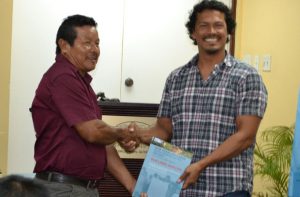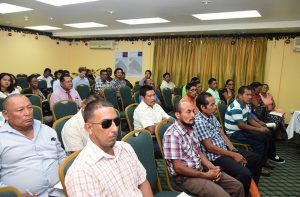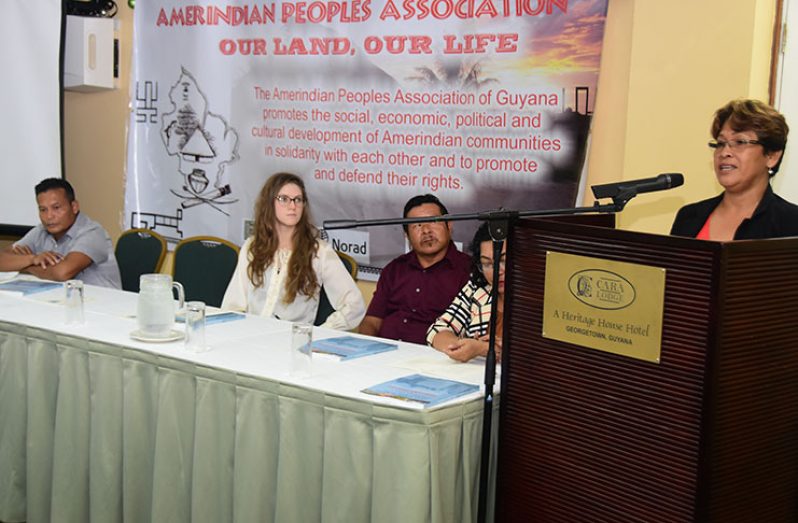– APA wants independent national tribunal established to address grievances
A STUDY conducted in 42 Indigenous settlements in regions One and Two has seen fresh calls for the 2006 Amerindian Act to be reviewed and for an independent national tribunal to be set up to address Indigenous peoples’ grievances and territorial claims.
At the same time, the report on the study highlights the dismissive tone of Indigenous Affairs’ ministers under the previous administration regarding efforts by several communities to secure land titles.
Executive Director of the Amerindian People’s Association (APA), Ms. Jean La Rose, while presenting the findings of the report of a Participatory Assessment of the Land Tenure Situation of Indigenous Peoples in Guyana: Regions 1 and 2, at the Cara Lodge in Quamina Street on Friday, said the study was conducted between 2011 and 2015 by the APA and its partner, the Forest Peoples Programme (FPP); and the research involved 35 Indigenous villages and communities in Region One and seven villages in Region Two.

Of the villages surveyed, 29 held land titles, and they all expressed dissatisfaction with the area their titles covered, because their existing legal boundaries do not cover vital customary lands and settlements, spiritually important sites and traditional resource areas.
This has seen Government authorities occasionally preventing residents living outside title boundaries from voting in Village Council elections.
While 69% of the communities surveyed are in possession of land titles, the remaining communities are still in the dark regarding their land titles, the report stated.
The report points to a historical issue of free, prior and informed consent (FPIC) during the consultation process for those communities which were eventually issued with titles. According to the report, as far back as in the 1960s, the Amerindian Land Commission (ALC) at the time visited some villages, but it did not consult with the residents or obtain their agreement to the ALC’s final recommended title areas.
“These non-agreed titled areas were used in the 1976 Amerindian Act, and again in titles issued in 1991 under the State Lands Act”, the report said.
According to the report, titles issued in the last twenty years have not met the FPIC (free, prior and informed consent) standard, since the former Ministry of Amerindian Affairs had decided the final titled areas without first obtaining the communities’ agreement. The report pointed to the 2007 case of Yarakita in the Mabaruma Sub-Region in that regard. It also listed two instances at Kariako (Moruca Sub-Region) and Eclipse Falls (Matarkai Sub-Region) in which agreement was not obtained from residents in those areas prior to the issuance of titles.
The report points to interference from “local government authorities”, whom it noted pressured some chairpersons from community development councils (CDCs) to drop plans to apply for communal titles. The community of Barabina, at Mabaruma, was pointed out in that regard, where, according to the report, the Guyana Lands and Surveys Commission (GL&SC) had “pushed for individual land titles. The GL&SC was also seen as responsible for the communities of Canal Bank, Citrus Grove and Oronoque, near Port Kaituma, withdrawing their request for titles.

Meanwhile, parties in the mining and forestry extractive sectors are also held responsible for the long delay in the issuance of titles. “Villages suspect that long delays in official processing of their titles and strange behaviour in the handing over of title documents (‘five minute titles’) may often be due to interference by miners or loggers (who) hold permits or are making claims on lands owned or claimed by a village”, the report stated.
The report further said that, in several instances, the former Ministry of Amerindian Affairs has admitted that changes to title boundaries and delays in granting titles were due to competing mining claims and interests.
According to La Rose, over the years, several of the results pointed out in the report were addressed.
Several officials from state agencies, including the Ministry of the Presidency, the Guyana Forestry Commission, the Guyana Geology and Mines Commission and civil society bodies received copies of the report on Friday.



.jpg)








